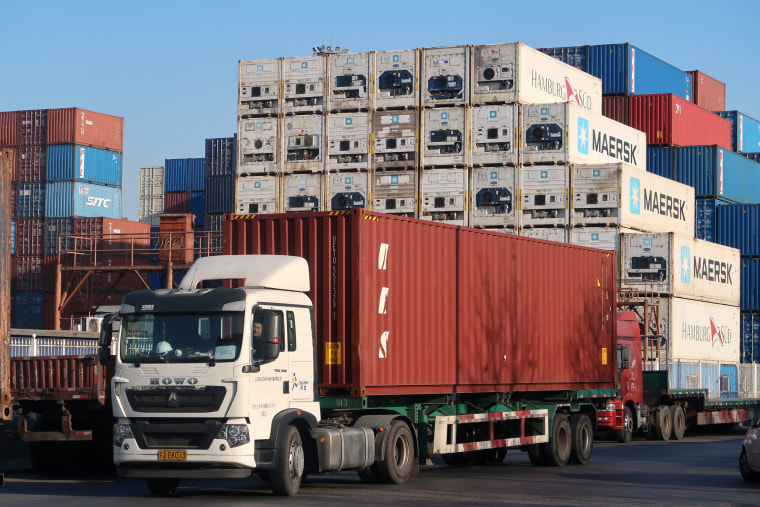Following the news that a phase one China trade deal had been forged, President Donald Trump tweeted that phase two negotiations would begin “immediately,” rather than after the 2020 election, as he had suggested in recent days.
Trade and market experts cautioned, though, that although the phase one deal included key market concerns such as some tariff reductions and a cancellation of sanctions on consumer goods that had been set to kick in on Sunday, it would take time to tackle more entrenched challenges such as forced technology transfers and Chinese state subsidies of key industries.
“Structural issues like subsidies and the role of state-owned enterprises must wait for additional phases of negotiations,” said Doug Barry, spokesman for the U.S.-China Business Council, adding, “The hope is that both sides will leverage the goodwill generated by this initial phase and build on it with additional agreements that level the playing field for U.S. companies.”
Many expressed skepticism that negotiators would reach a resolution before next November, though. “Trump and his advisers might still talk about trying for a phase two deal aimed at tackling China’s subsidies, but even they must realize now that it’s not going to happen,” said Mark Williams, chief Asia economist at Capital Economics. “China has no interest in changing course on any of this,” he said.
Chinese leader Xi Jinping’s major economic plans such as “The Belt and Road Initiative” and “Made in China 2025” depend on practices American negotiators — and executives — see as trade deal breakers.
“If you include in phase two a lot of the really contentious issues, trade in advanced technology, investment — I just don’t see any way that can be resolved in the short run and possibly not even after the election,” said Peter Petri, a professor of international finance at the Brandeis International Business School. “They’re really fundamental to the differing strategies of the two countries.”
The White House decision to pull out of the Trans-Pacific Partnership cost the U.S. the kind of leverage it needed to effectively pressure Beijing. “Usually, in dealing with China, their hand is best forced when they’re approached by a large contingent of other countries, but so far, we’ve approached them alone,” said Jeff Mills, chief investment officer of Bryn Mawr Trust. “I think that makes it more difficult for us to make progress on some of those larger issues.”
Some experts say that regardless of the outcome of the 2020 election, these issues are likely to remain entrenched — and that a second-term Trump presidency could add unpredictability and market risk.
“The China issue isn’t going away, and it’s not going to go away if we have another Trump presidency or if we have a Democrat,” said Monica de Bolle, a senior fellow at the Peterson Institute for International Economics. “These are all issues that are going to be with us for the long haul.”
One particular hurdle to forging a sweeping trade pact would be Beijing’s unwillingness to commit publicly to a deal with a president who has a habit of making pronouncements or commitments only to reverse them later, and who has threatened tariffs against economic and diplomatic allies over non-trade-related disputes.
“People won’t trust his delivery,” Petri said. “Trump is very keen both on the unpredictability of it and on using tariffs to gain negotiating leverage.”
To the extent that Trump views re-election as a mandate from the American people to get tough on China, experts warn that he could pursue a protectionist agenda without fearing repercussions from any economic fallout.
“If President Trump is re-elected, I expect the trade war with China will reintensify next year,” said Mark Zandi, chief economist at Moody’s Analytics. “The president will view his reelection as a green light to take another crack at China’s trade practices. This will remain a cloud over the American economy,” he said.
“I think he would definitely be emboldened and he will continue to be ‘tariff man’ because he thinks they’re effective,” de Bolle said. “The fact that he wants to appear as if he’s playing nice with China now has absolutely no bearing on what he’ll do if he gets re-elected.”
This has implications not only for policymakers, but for corporate America, which has by and large been holding off on big investments until more clarity on trade emerges — clarity that could remain elusive in a second-term Trump presidency. “A big uncertainty facing [the] business community is that a re-elected Trump could go either way,” said David Dollar, a senior fellow at the Brookings Institution.
“To the extent he remains in office and runs trade policy as he seems to be doing… there will be this on-and-off-again character that drives businesses mad," Petri said. “It’s very difficult to plan and invest in this kind of environment."
